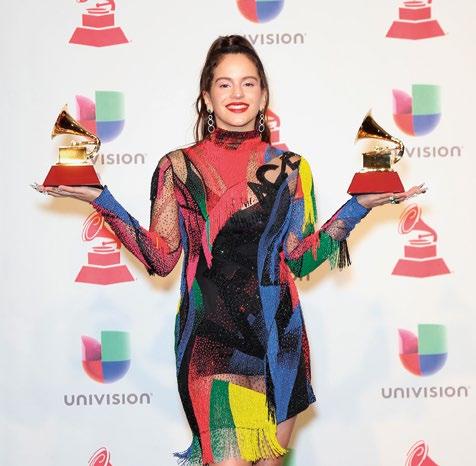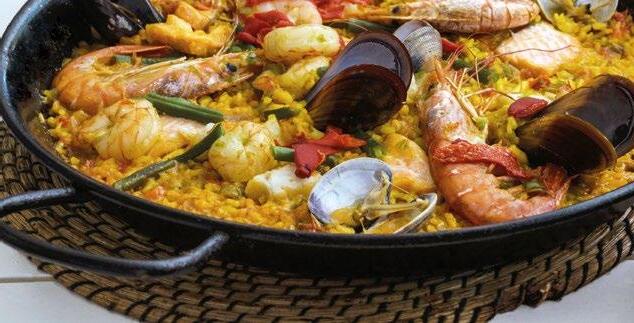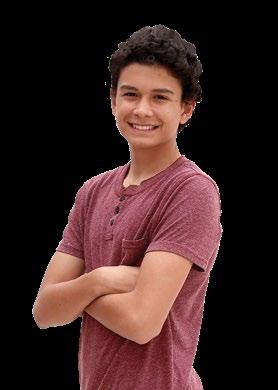




An inclusive, communicative Spanish program that speaks to today’s young learners
• to learn about the Spanish language
• to use everyday expressions and words
• to learn the Spanish alphabet and its sounds
• to learn about the location of Spanish-speaking countries
• to find out traditions and celebrations in Spanish-speaking countries




• SPANISH AROUND THE WORLD 3
- The most-spoken languages in the world
- Spanish on the Internet
- The most studied languages in the world
- Countries with the most Spanish speakers
• SPANISH IN THE UNITED STATES 4
- Essential facts
- State and city names that originate from the Spanish language
- Spanish words used in English
- Famous people who speak Spanish
• HISTORY OF THE SPANISH LANGUAGE 5
• HOLA, ¿QUÉ TAL? 7
- Los saludos
- Las despedidas
- Los saludos en los diferentes países hispanohablantes
• LETRAS Y SONIDOS 10
- El alfabeto y los sonidos
- Una letra, dos sonidos: R, C, G
• ¿DE DÓNDE ERES? 12
- Mapa de América
- Mapa de España
- Mapa de Guinea Ecuatorial





• ¿QUÉ DÍA ES HOY? 14
- Los días de la semana
- Los meses
- Los números del 0 al 31
- Las fechas
• ¿QUÉ TIEMPO HACE? 16
- El tiempo
- Las estaciones
- Los hemisferios
• EN EL SALÓN DE CLASE 18
- Objetos y personas del salón de clase
- ¿Qué es esto?
• ¿PUEDE REPETIR, POR FAVOR? 20
- Pedir información
- Cortesía
- Pedir permiso
- Disculparse
- Dar instrucciones
- Expresiones útiles
- ¿Tú o usted?
• RAZONES PARA APRENDER ESPAÑOL 21
- Some occupations that require Spanish
- You will need Spanish if you want to...
• ENERO
Día de Reyes (Puerto Rico)
• FEBRERO
Carnaval de Barranquilla (Colombia)
• MARZO
Las Fallas (España)
• ABRIL
Feria de Abril (España)
• MAYO
Día de la Afrocolombianidad (Colombia)
• JUNIO
Inti Raymi (Perú)
• JULIO
Día de Simón Bolívar (Venezuela)
• AGOSTO
Día del Folklore Argentino (Argentina)
• SEPTIEMBRE
Grito de Dolores (México)
• OCTUBRE
Día de la Resistencia Indígena (Nicaragua)
• NOVIEMBRE
Día de Muertos (México)


• DICIEMBRE
Fin de Año (países hispanohablantes)
• to name and locate areas in a school 172
• to talk about school subjects and describe schedules 174
• to describe school uniforms and talk about dress code 176
• to talk about school rules 178
• the education system in Colombia 173
• uniforms and regulations in Colombian schools 176
• the work of the writer Yolanda Reyes 178
• a Colombian education project promoted by Shakira 180
• VIDEO Juan José introduces himself and his country 168
• CAMERA FOTOGRAFÍA Colegio en El Retiro, Cali 170
• align-left CHAT Reporteros’ group chat conversation 171
• CAMERA PLANO Juan José’s school 172
• DIÁLOGO Juan José shows his school to a new student 172
• VIDEO Colegio Gimnasio del Norte, Bogotá 173
• CAMERA HORARIO ESCOLAR Juan José’s schedule 174
• align-left PÁGINA WEB Uniformes escolares, GMH Design 176
• align-left TEXTO Manual de convivencia escolar, Colegio La Salle Envigado 177
• align-left CUENTO “Un árbol terminantemente prohibido”, El terror de Sexto “B”, Yolanda Reyes 178

• CAMERA align-left REPORTAJE Educación para todo el mundo 180
• telling time 182
• stem-changing verbs: empezar and poder 184
• areas of a school 186
• school schedule 187
• subjects 187
• clothes 188
• permission and prohibition 188
• the letter Ñ 188
Crear un folleto informativo de tu colegio ideal. 189
How do Colombian school differ from American schools? What places, people, activities, and rules define student life?
• to describe how you feel 192
• to compare different school systems 194
• to describe someone's personality and qualities 196
• to talk about school campaigns 198
• students’ roles in Colombia 191
• schedules, holidays, and homework in Spanishspeaking countries 194, 195
• Colombian Teachers’ Day 197
• a Colombian positivity school campaign 198
• CAMERA CARTEL Gobierno escolar 190
• align-left CHAT Reporteros’ group chat conversation 191
• align-left CORREO ELECTRÓNICO Juan José 192
• align-left TEST ¿Qué tipo de estudiante eres? 193
• CAMERA INFOGRAFÍA Horas de tareas por semana en Secundaria, Ministerio de Educación 194
• DIÁLOGO Juan José and Laura 194
• align-left ARTÍCULOS school systems 195
• align-left TEXTO La profesora del año 196
• CAMERA CARTEL Día del Maestro, Asoc. Niños de Papel 197
• CAMERA align-left CAMPAÑA ¿Qué no tienen que hacer los candidatos a personeros?, MOE 198
• CAMERA IMAGEN Tarjetón electoral, Institución Educativa Arturo Velásquez Ortiz, Santa Fe de Antioquia 199
• MENSAJES DE VOZ Candidates for personero/a 199
• CAMERA align-left REPORTAJE ¡No al acoso escolar! 200
• estar to describe feelings and moods 202
• comparatives: superiority and inferiority 204
• superlatives 205
• feelings and moods 206
• elections and school life 206, 207
• qualities and personality 208
• the sound of J, GE, and GI 208
MINIPROYECTO 2
Crear un póster para un/a candidato/a a personero/a. 209
FINAL
Crear un video para presentar nuestro colegio. 210
PREPARO LA EVALUACIÓN
• Interpretive mode 212
• Presentational mode 213
• Interpersonal mode 214
NUESTRAS CULTURAS
• Cultural comparisons 215
• to talk about daily routines 220, 222
• to talk about meal times 220, 222
• to provide information about extracurricular activities 224
• to talk about sports 226
• schedules in Spain 219
• breakfast and merienda in Spain 221, 223
• flamenco music 225
• popular sports in Spain and other Spanish-speaking countries 226
• la pelota vasca 227
• the FC Barcelona Sports Academy 228
• VIDEO Laura introduces herself and her country 216
• CAMERA FOTOGRAFÍA La Familia Real española 218
• align-left CHAT Reporteros’ group chat conversation 219
• CORTOMETRAJE Rutinas, Ana Vidal 220
• CAMERA FOTOGRAFÍA breakfast table 221
• align-left CUENTO “El sueño de la vida”, Clic de Ensueños, Juan José Clavel Muñoz 222
• VIDEO Laura talks about extracurricular activities 224
• align-left ARTÍCULO La rutina de Adrián Martín, artista de flamenco 225
• align-left ARTÍCULOS Sports in Spain and other Spanish-speaking countries 226
• MENSAJE DE VOZ The most popular sports in Argentina 227
• CAMERA align-left REPORTAJE La Masía: una escuela de vida 228
• reflexive verbs: ducharse, lavarse, levantarse 230

• stem-changing verbs: vestirse, despertarse, acostarse, jugar 232
• the verb ir 233
• daily routines 234
• linking words 234
• meals 235
• extracurricular activities 236
• sports 236
• the sounds of S, CE, CI, and Z 236
Crear un videoblog sobre tu rutina diaria. 237
What is a typical daily routine for a Spanish teenager? How do young people enjoy their free time in Spain?
• to talk about leisure activities 240
• to talk about activities that are happening right now 242
• to provide information about screen time habits 244
• to talk about how you use your cell phone and about plans to develop good habits 246
• a Spanish cartoonist: Laura Pacheco 238
• leisure activities in Spain 240
• eSports in Spain 241
• famous plazas in Madrid 242
• how Spanish teenagers use their cell phones 246
• a young adult fiction writer: Laura Gallego 248
• CAMERA VIÑETA Ocio digital, Laura Pacheco, El País 238
• align-left CHAT Reporteros’ group chat conversation 239
• CAMERA INFOGRAFÍA Ocio y modelos de vida, FAD 240
• CAMERA ILUSTRACIONES Plaza de Oriente y Puerta del Sol, Juan Berrio 242
• DIÁLOGOS Laura talks about plans 243
• align-left TEST ¿Vives dentro o fuera de las pantallas? 244
• align-left ARTÍCULO Adolescentes: la vida en el móvil, Silvia Oviaño, El Mundo 246
• DIÁLOGO Juan and Laura talk about cell phone addiction 247
• CAMERA align-left REPORTAJE Laura Gallego: la reina de la literatura juvenil española 248
• the present progressive: estar + present participle 250
• direct object pronouns 252
• ir a + infinitive 253
• leisure activities 254, 255
• statistics 254
• electronic devices 256
• the sound of B and V 256
Crear un cómic sobre tu tiempo libre. 257
Presentar un campamento de verano para jóvenes. 258
PREPARO LA EVALUACIÓN
• Interpretive mode 260
• Presentational mode 261
• Interpersonal mode 262
• Cultural comparisons 263
• to talk about clothing items and describe outfits 268
• to talk about fashion and styles 270
• to locate things in relation to the speaker 272
• to interact with a salesperson 272
• to choose a gift for someone 274
• the city of Lima 267
• Social-justice oriented and sustainable Peruvian fashion 268
• Peruvian textiles 269
• Peruvian fashion bloggers 270
• Meche Correa, a Peruvian designer 276
• VIDEO Andrés introduces himself and his country 264
• CAMERA FOTOGRAFÍA Centro comercial Larcomar, Miraflores, Lima 266
• align-left CHAT Reporteros’ group chat conversation 267
• CAMERA PÓSTER Peruvian clothes and accessories 268
• CAMERA FOTOGRAFÍAS Peruvian fashion bloggers 270
• align-left PUBLICACIONES BLOG Reporteros talk about fashion and styles 271
• CAMERA VIÑETAS Dialogues in a clothing store 272
• DIÁLOGO Andrés interacts with a salesperson 273

¡Habla, causa! ¿Cómo estás? Me llamo Andrés y soy peruano.
• DIÁLOGO Andrés goes shopping to buy some gifts for his friends 275
• CAMERA align-left REPORTAJE Meche Correa: entre tradición e innovación 276
• demonstrative adjectives and pronouns 278
• question words 280
• indirect object pronouns 281
• clothes 282
• accessories 282
• styles 282
• useful phrases in a store 283
• numbers from 100 to 1000 283
• stores 284
• diphthongs 284
MINIPROYECTO 1
Representar una escena en un mercado de segunda mano. 285
How does fashion shape the identity of Peru? What makes Peruvian gastronomy so special?
• to talk about food and healthy diet 288
• to talk about eating habits 290
• to interact in a restaurant 292
• to identify dishes and ingredients 293
• typical Peruvian food and drinks 288, 292
• Peruvian superfoods 289
• Peruvian cuisine as a fusion of cultures 294
• CAMERA CAMPAÑA Los buenos cebiches, Ingenioart 286
• align-left CHAT Reporteros’ group chat conversation 287
• CAMERA INFOGRAFÍA Pirámide nutricional peruana andina, Instituto Nacional de Salud 288
• align-left ARTÍCULOS The eating habits of young Peruvians 290
• DIÁLOGO Andrés and his cousin talk about their eating habits 291
• align-left DIÁLOGO A conversation in a restaurant 292
• align-left CARTA A restaurant’s menu 293
• DIÁLOGO Andrés and his mother at a restaurant 293
• CAMERA align-left ARTÍCULO Mezcla de culturas gastronómicas 294
• CAMERA align-left REPORTAJE La cocina nikkei 296
• adjectives of quantity + noun 298
• the preterite tense 300
• food 302
• feelings : tener hambre, tener sed 303
• diets 303
• useful phrases in a restaurant 304
Y LETRAS
• hiatus 304
MINIPROYECTO 2
Crear un food truck de cocina peruana 305
PROYECTO FINAL
Crear una guía de viaje para turistas en el Perú. 306
PREPARO LA EVALUACIÓN
• Interpretive mode 308
• Presentational mode 309
• Interpersonal mode 310
NUESTRAS CULTURAS
• Cultural comparisons 311
The Spanish Hub is a platform offering digital content and resources for students and teachers who work with REPORTEROS.
It is designed with a clear purpose in mind: to improve teaching and learning experiences in middle school and high school environments with engaging content and helpful, user-friendly tools. The platform offers easy access to a vast array of material in different formats to help students better grasp and practice concepts, build their skills, develop cultural insights, and meet learning objectives. The Spanish Hub is easy, flexible and intuitive for all users.
The interactive textbook versions of the Student Edition and the Workbook allow for a full digital learning and teaching experience. Students can write directly in the writing fields, record themselves, attach files, self-correct, re-do activities...
The Spanish Hub delivers digital content in an interface that is intuitive and straightforward for all types of users, compatible with all smartphones and tablets via an application allowing teachers and students to work offline and online, giving everyone the opportunity to work at any time from anywhere.
• Smartphones and tablets: iOS and Android
• Computers: Windows, Mac, Chrome OS, and Linux

• An interactive version of the Student Edition
• An interactive version of the Workbook
• An enriched eText version of the Student Edition
• An enriched eText version of the Workbook
• Audio files with scripts
• Videos with scripts and subtitles in English and Spanish
• Videos with subtitles for students who are hearing impaired
• Grammar tutorials (video)
• Pronunciation tutorials (video)
• Audio versions of all the texts
• Extra materials
• Interactive quizzes
• Teacher’s assignments and messages
• Worksheets for heritage students
• Differentiation worksheets
• Assessment rubrics
• Self and peer rubrics
• Spanish-English and English-Spanish glossaries
• Maps ...and more!
You may have received an online access code with your textbook. If not, you can purchase one at klettworldlanguages.com.
Throughout the book, you will find the following icons and boxes.
Activities marked with this icon have been created specifically to develop critical thinking skills. In these activities, you will reflect critically on what you have read, on your own culture, and on the cultures of others.
The magnifying glass indicates that you are going to analyze an aspect of the language in order to understand it better. Many times, you will be able to compare Spanish with English and work out the rules by yourself.
Brief explanations and examples of the grammar structures that you are going to use.
Lists of the words you are going to need to do the activities, translated or pictured.
Information about a cultural topic relating to the page’s subject matter and documents, as well as activities.
Strategies and advice for reading, listening, writing, speaking, memorizing, looking for information on the Internet, or creating different products like videos or presentations.
The stars indicate the level of difficulty of the grammar and vocabulary practice activities.
Activities marked with this icon are challenges.
The loudspeaker indicates a listening activity or a text recording (a text read by a native speaker). Pair
Some typical words found in the variety of Spanish used in each unit’s featured country.
Videos and playlists that will broaden your horizons concerning some of the topics presented.
DIFFERENTIATION
This icon highlights the digital resources available on The Spanish Hub platform for each double page spread of the book.
GRAMMAR TUTORIAL Grammar video tutorials
PRONUNCIATION TUTORIAL Pronunciation video tutorials
ASSESSMENT RUBRIC
SELF AND PEER ASSESSMENT RUBRIC
SELF-CHECK QUIZ
Pronunciation and spelling section.
Suggestions for adapting projects to any situation: with or without digital tools.
Worksheets to differentiate instruction
Rubrics for the Miniproyectos and Proyectos finales, the Preparo la evaluación IPA activities and the Nuestras culturas section (intended for teachers and students)
Rubrics for the Miniproyectos and Proyectos (intended for students)
Interactive grammar and vocabulary quizzes
HERITAGE Worksheets for heritage students E-WORKBOOK Interactive version of the Workbook